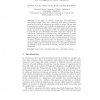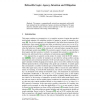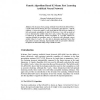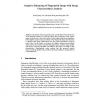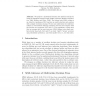107
Voted
DEON
2004
Springer
15 years 7 months ago
2004
Springer
Abstract. In this paper we investigate the specification and verification of information systems with an organizational structure. Such systems are modelled as a normative multia...
104
click to vote
DEON
2004
Springer
15 years 7 months ago
2004
Springer
In an organizational context the norms that apply to an agent depend on the roles he holds in the organization. The deontic characterization of structural roles is defined when th...
102
Voted
DEON
2004
Springer
15 years 7 months ago
2004
Springer
Abstract. In this paper, we combine deontic logic with Alternatingtime Temporal Logic (ATL) into a framework that makes it possible to model and reason about obligations and abilit...
125
click to vote
DEON
2004
Springer
15 years 7 months ago
2004
Springer
This work addresses the issue of obligations directed to groups of agents. Our main concern consists in providing a formal analysis of the structure connecting collective obligatio...
114
click to vote
DEON
2004
Springer
15 years 7 months ago
2004
Springer
We propose a computationally oriented non-monotonic multi-modal logic arising from the combination of agency, intention and obligation. We argue about the defeasible nature of thes...
111
Voted
DEON
2004
Springer
15 years 7 months ago
2004
Springer
This paper studies the logic of a dyadic modal operator for being obliged to meet a condition ρ before a condition δ becomes true. Starting from basic intuitions we arrive at a s...
109
Voted
AUSAI
2004
Springer
15 years 7 months ago
2004
Springer
Abstract. The interpretation of complex discourse, such as arguments, is a difficult task that often requires validation, i.e., a system may need to present its interpretation of ...
126
Voted
AUSAI
2004
Springer
15 years 7 months ago
2004
Springer
The K-means Fast Learning Artificial Neural Network (KFLANN) is a small neural network bearing two types of parameters, the tolerance, δ and the vigilance, µ. In previous papers,...
130
Voted
AUSAI
2004
Springer
15 years 7 months ago
2004
Springer
The quality of the fingerprint images greatly affects the performance of the minutiae extraction. In order to improve the performance of the system, many researchers have been made...
119
click to vote
AUSAI
2004
Springer
15 years 7 months ago
2004
Springer
We propose a multivariate decision tree inference scheme by using the minimum message length (MML) principle (Wallace and Boulton, 1968; Wallace and Dowe, 1999). The scheme uses MM...

